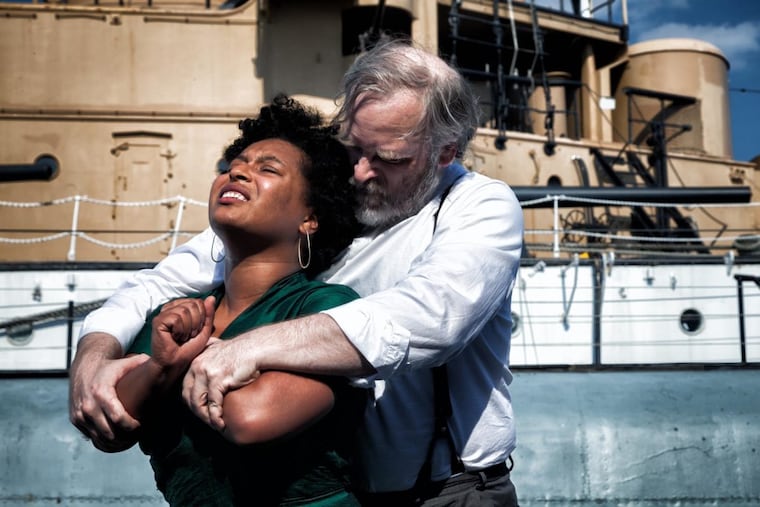'Iphigenia' at the Fringe: Ancient emotions, flawed but moving show
The Philadelphia Artists' Collective performs "Iphigenia at Aulis," the last tragedy written by Euripides, on board the USS Olympia through Sept. 22 for Philadelphia Fringe. It's a heartbreaking tale of the conflict between familial love and duty to the nation-state. While short on subtlety, PAC's version is still undeniably moving.

The story of Euripides' Iphigenia at Aulis, now being performed by the Philadelphia Artists' Collective as part of Philadelphia Fringe, is a heart-tugging ode to the conflict between love and honor, between the bonds of family and the demands of the nation-state. PAC's mission is to exhume and revitalize rare classic works, and this Greek tragedy, adapted from a 1929 verse translation by the scholar Florence M. Stawell, is an apt choice.
For FringeArts, PAC squeezes the hour-long play's high-pitched action into an intimate deck space on board the USS Olympia, a cruiser billed as the oldest steel warship still afloat. Director Dan Hodge and costume designer Robin Shane update the story by garbing the actors in Edwardian dresses and naval jackets with gold epaulets and braid. Two singing seamstresses with lovely voices serve as the Greek chorus. A gun makes an anachronistic appearance.
The drama itself is a prologue to the Trojan War events chronicled in Homer's Iliad. It involves the decision of the Greek king Agamemnon — brother to Menelaus, whose wife, Helen, has eloped with Paris of Troy — to sacrifice his oldest daughter, Iphigenia, at the behest of the gods. Only by offering up his daughter, a prophet has told him, can he stir up favorable winds for the journey to Troy.
In Euripides's version of the story, the way forward is far from clear. Agamemnon (Nathan Foley), Menelaus (Luke Moyer), and Iphigenia herself (Becca Khalil) all change their minds at various points, while her mother Clytemnestra (Tai Verley) and the warrior Achilles (Gregory Isaac) both try to save Iphigenia. The grief-stricken mother strikes the play's most radical pose by questioning not just the exigencies of patriotism and war, but the very existence of the gods.
As in most Greek tragedies, the actual violence takes place offstage, and what we see is the psychological drama that precedes it. Unfortunately, Hodge's production eschews any sort of subtlety in favor of shrieking, shouting, and mostly over-the-top performances. The emotions involved are extreme enough, and the space small enough, that far less would have been more.
Foley's Agamemnon, the play's most tragic figure, doesn't emerge as either particularly loathsome or particularly sympathetic. By contrast, Isaac's Achilles is an impressive anchor, a warrior determined at first to rescue a maiden in distress, and then awed by her courage.
Khalil's Iphigenia traverses the dramatic arc from naïve child of a treacherous father to heroic martyr with increasing conviction. Her exaltation of the needs of the nation and decision to embrace fame over life itself may not be entirely convincing. Nor are they meant to be. But the emotions involved are recognizable even today, and they render even this flawed production undeniably moving.
Iphigenia at Aulis. Through Sept. 22, presented by the Philadelphia Artists' Collective on board the USS Olympia, near Independence Seaport Museum at Penn's Landing, for the Philadelphia Fringe. Tickets: $25. Information: 215-413-1318, fringearts.com.